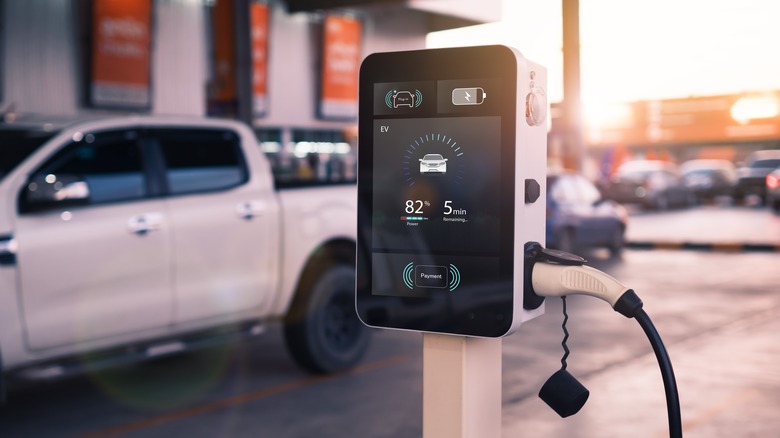What's Going To Happen To Gas Stations After EVs Take Over?
Gas stations are a common sight in most countries; without them, we wouldn't be able to get around. But with alternatively powered transportation methods on the rise, we may soon see a time when the demand for gas dies out. So what are gas stations going to do when no one is filling up their tank?
There are at least 145,000 gas stations in the United States, according to the American Petroleum Institute, which is roughly three times the number of public electric vehicle charging facilities currently available. However, this is set to change in the coming years. The White House has been among those pushing for an improvement in electric vehicle infrastructure, with President Biden outlining plans to build half a million EV charging stations across the country by the end of the decade. Major companies including GM, Volkswagen, Tesla, Electrify America, and Siemens are all contributing to the nation's EV charging infrastructure, too.
That infrastructure is being put in place for a good reason: electric vehicle uptake has skyrocketed over the past few years and is set to increase even further as improvements in technology and access to charging facilities make owning an EV more practical. Then there is a decline in vehicle use caused by a rise in remote work and food delivery services, which drops the demand for fuel overall. Consulting firm BCG says up to four-fifths of the current "fuel retail" network could struggle to see any profit by 2035. The firm also predicts that sales of electric vehicles are expected to outpace those of fossil fuel-powered cars by 2030. So what happens to gas stations when they start costing their owners more money than they're worth?
Gas stations could adapt to the market
Like most businesses that become nothing but a money sink, loss-making gas stations that can't turn things around will more than likely close. But there is a good chance some gas stations will adapt their business models and find ways to stay relevant as the transportation industry continues to evolve. Truck stop chain Pilot is already hedging its bets, and made the installation of electric charging ports a large chunk of its $1 billion travel center modernization plan. While some American gas stations are going electric by choice, gas stations in Germany don't really have a say in the matter; a law was passed in recent years forcing them to offer EV charging facilities alongside their fossil fuel-based services.
There is also the possibility that electric won't be the only green choice in the future. Despite the majority of businesses and governments making EVs their clear pick, alternatives like hydrogen fuel cell vehicles and highly efficient biofuels do exist. There's a chance the space currently used by gas stations could serve a similar purpose if a new type of green vehicle breaks into the market. Finally, there's the fact a lot of gas stations sell more than just gasoline. In many areas, they act as convenience stores that sell food, drinks, and everyday items to the local population. In some cases, the local gas station may be the only place someone can get something at a particular hour. Stores like this are more likely to survive than gas stations based on highways that make most of their income from fuel sales. When electric cars eventually take over, the gas station, which has been pretty constant for over 100 years, will either find a way to adapt or disappear.

